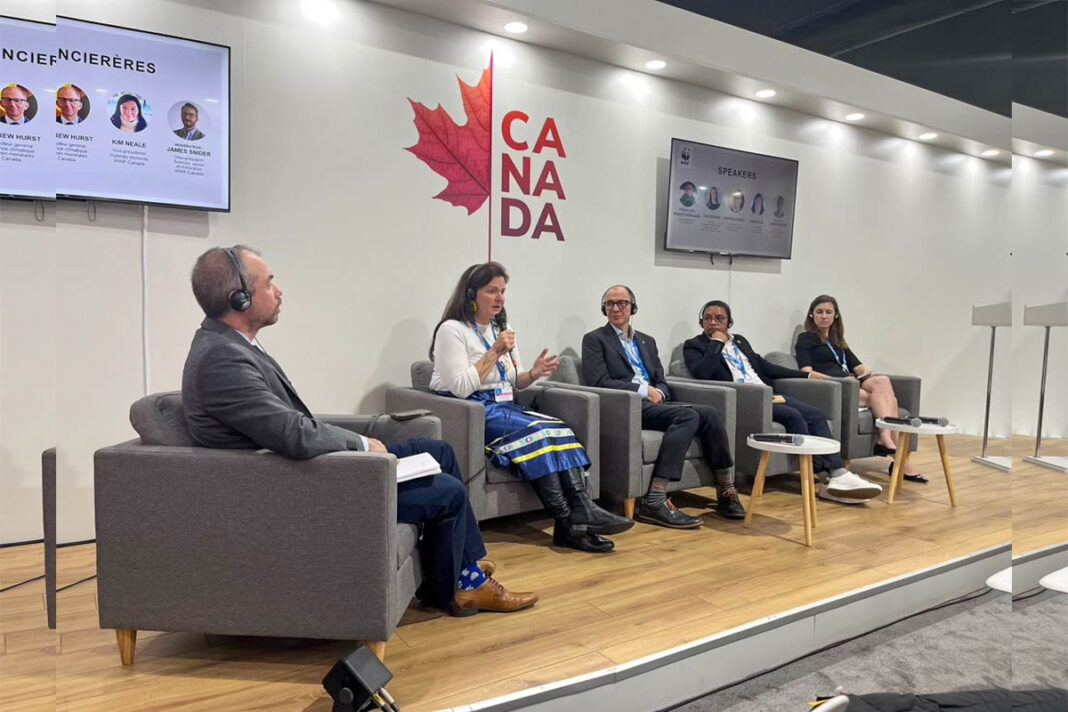BAKU, Azerbaijan—Kim Neale, vice president of Resilient Habitats at WWF-Canada and a proud resident of Manitoulin Island, has returned from COP29 with a mix of optimism and resolve. As one of Canada’s key voices at the international climate summit, she championed Indigenous-led conservation and called for urgent action to address the escalating climate crisis.
COP29, the 29th Conference of the Parties under the United Nations Framework Convention on Climate Change (UNFCCC), brought together leaders from nearly 200 nations to discuss strategies for limiting global warming, increasing climate resilience, and transitioning to sustainable economies. Hosted in Baku, Azerbaijan, this year’s summit focused heavily on climate finance and the integration of Indigenous knowledge into global mitigation efforts.
Ms. Neale played a prominent role at COP29, speaking at the Canadian and WWF pavilions on panels addressing community-led regenerative economies. Her work as an expert in ecological economics and conservation finance focuses on integrating Indigenous knowledge with western science to protect ecosystems and support sustainable development.
“In transitioning to a more compassionate and regenerative financial system, we need to embrace ‘two-eyed seeing’—blending traditional Indigenous knowledge with contemporary economic practices,” Ms. Neale told The Expositor. “This shift is essential to build systems that serve both humanity and the planet.”
Ms. Neale highlighted the disparity in conservation funding, noting that less than one percent of resources are directed to Indigenous-led initiatives, despite their proven effectiveness in protecting biodiversity. She called for systemic changes to address this imbalance, referencing WWF-Canada’s Resilient Habitats Fund, which aims to disrupt traditional funding structures by prioritizing Indigenous leadership.
Ms. Neale praised Canada’s negotiators for their dedication to advancing Indigenous rights and climate justice on the global stage. During the Indigenous Peoples Caucus, representatives from Canada supported proposals to strengthen the New Collective Quantified Goal (NCQG), a framework to channel funds from wealthy nations in the global North to support climate action in the global South.
“Canada’s negotiators were instrumental in amplifying the voices of Indigenous Nations,” Ms. Neale said. “Their efforts demonstrated a genuine commitment to implementing the United Nations Declaration on the Rights of Indigenous Peoples (UNDRIP).”
The NCQG is seen as a cornerstone of COP29, aiming to deliver much-needed financial support for climate mitigation and adaptation in vulnerable regions. However, negotiations were fraught with challenges, including inadequate funding commitments from wealthy nations.
Ms. Neale expressed frustration with the slow progress in securing meaningful climate finance agreements, calling the current proposals “insufficient.” Wealthier nations, responsible for the majority of historical greenhouse gas emissions, have yet to pledge funding levels adequate to meet the needs of the global South.
“We’re in a climate emergency that’s already impacting every Canadian, from rising inflation to more frequent and severe floods, wildfires, and droughts,” she said. “For communities in the global South, who have contributed the least to the crisis, the consequences are even more devastating.”
Despite these frustrations, Ms. Neale found hope in Canada’s approach to the negotiations, describing it as a “beacon of hope for future generations.”
Beyond the negotiations, Ms. Neale’s participation in COP29 reinforced her commitment to climate action at home. Residing on Manitoulin Island, Neale is deeply involved in local conservation efforts, including volunteering with the Escarpment Biosphere Conservancy Indigenous committee. She also mentors youth, focusing on climate resilience and food security initiatives.
“While the negotiations didn’t achieve everything we hoped for, I’m returning home motivated to push for greater funding commitments and support for Indigenous-led conservation,” she said. “These actions are crucial to making our communities more resilient to the impacts of climate change.”
Ms. Neale’s role at COP29 underscored the importance of bridging local and global efforts to tackle the climate crisis. Her work with WWF-Canada, where she leads initiatives integrating Indigenous and scientific approaches, is a testament to the power of collaboration.
As the summit concluded, Ms. Neale reflected on the path forward: “Canada has shown that it can lead on the world stage, championing climate justice and Indigenous rights. Now, it’s up to all of us to ensure that these commitments translate into real change for people and the planet.”
COP29 may have ended, but the work is far from over. Ms. Neale’s voice and actions exemplify the growing movement to place Indigenous-led solutions at the heart of global climate strategies—an approach she believes is vital for building a resilient future for all.






